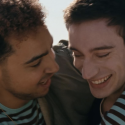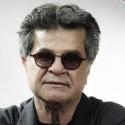Seeing and hearing A Field in England's Richard Glover sing "Baloo, My Boy" while in bedraggled character reminded me of the power often exerted by songs explicitly or implicitly germane to a movie's narrative. They tend to have far greater resonance than songs added during post-production to build atmosphere, stoke emotions, or sell soundtrack albums, not that there aren't stirring examples of extra-diegetic songs: Tex Ritter's "The Ballad of High Noon", "The Windmills of Your Mind" in the 1968 The Thomas Crown Affair, "I Wanna Be Adored" in Welcome to Sarajevo, and "Skyfall", to name four at random.
The following songs, all sung by characters and/or extras, strike me as essential to the stories' meanings. To test the theory that songs enhance drama, I omitted songs from musicals and comedies with musical numbers (calculated to entertain) and films about music industry folk (too easy), which means pop and rock got short shrift. There are a few numbers by cabaret and club entertainers. The choices are naturally subjective, though I was surprised to find that traditional songs figure so strongly: in fact, it was hard to leave out "The Nut-Brown Maid" from I Know Where I'm Going! and "Men of Harlech" from Zulu, both dramatically crucial. So (to paraphrase Alan Freeman) here's the countdown, movie lovers. All right? Stay bright.
20. "Buffalo Gals" in It's a Wonderful Life (1946)
Walking home in borrowed clothes after being drenched at the 1925 prom, George (James Stewart) and Mary (Donna Reed) celebrate falling in love by joyfully warbling John Hodges' 1844 minstrel song. But when he ignores the record of it she plays for him in her house during a lull in their courtship, she smashes it. Mary is never so feisty again. It's tempting (but wrong) to think that splendid tantrum inspired Malcolm McLaren's hip-hop version.
19. "Jerusalem" in The Loneliness of the Long Distance Runner (1962)
The progressive governor of the rural Midlands borstal in Tony Richardson's British new wave film has his charges sing the Hubert Barry hymn during assembly (pictured above), not realizing that institutionalization mocks the spirit of Blake's visonary words. It's quoted ironically at the end as the rebel Colin (Tom Courtenay) gets back to work in the machine shop having trounced authority.
18. "Hey You" in The Squid and the Whale (2005)
At a Brooklyn high-school talent show in Noah Baumbach's family tragicomedy, 16-year-old Walt (Jesse Eisenberg) performs with perfect deadpan an unplugged version of the Pink Floyd song from The Wall – a plea for unity in the face of alienation – and claims it as his own. Like shoplifting, it’s an unconscious cry for attention that results in the school calling in the parents whose selfish and erratic behavior has sabotaged Walt's capacity for moderacy.
17. "Who Were We" in Holy Motors (2012)
"Who were we when we were who we were?" Kylie Minogue's trench-coated torcher sings to her long-lost lover (fellow shapeshifter Denis Lavant) as she channels the ghost of Jean Seberg in Léos Carax's cineastic fever dream. Carax probably had his long-gone love affair with first-choice actress Juliette Binoche in mind, but newly blooded art-house star Kylie makes the melancholy number her own.
16. "Stuck in the Middle With You" in Reservoir Dogs (1992)
Mr. Blonde (Michael Madsen) puts Stealers Wheel's 1972 hit on a music player and does a shuffling dance to it in front of the tied-up and beaten Officer Nash (Kirk Baltz), prior to cutting off one of his ears (pictured below). He then douses him with petrol as the beat goes on. Quentin Tarantino picked up on the Dylanesque paranoia in Gerry Rafferty and Joe Egan's song, applying its aversion to music industry suits to the cop's terror of his tormentor. With typical counterintuitivity, Tarantino understood that the scene needed to be cool to work.
15. "So, We'll Go No More a-Roving" in The Master (2012)
Archly prancing and leering, 1950s cult leader and chartlatan Lancaster Dodd (Philip Seymour Hoffman) becomes a satyr as he sings the folk staple derived from Lord Byron's poem (circa 1817), which originated in a Scottish song. Though the lyrics are about desisting from constant lovemaking to preserve health, Hoffman's bawdy performance touts in front of his female followers, young and old, his willingness to exploit his power. It's presumably his randy acolyte, the traumatised Freddie Quell (Joaquin Phoenix), who mentally undresses the women, including Dodd's pregnant wife (Amy Adams).
14. "I'll Take You Home Again, Kathleen" in Rio Grande (1950)
John Ford's son-in-law Ken Curtis was a twerp as the singing cowboy whose "Skip to My Lou" taunts Vera Miles with her lover's absence in The Searchers (1956). He was a soulful light tenor with the Sons of the Pioneers group, however, and when in Rio Grande he and the US Cavalry's Regimental Singers serenade the estranged wife (Maureen O'Hara) of their commanding officer (John Wayne) with a yearning version of the sentimental Irish ballad, the couple recall the days of their bliss. "Kathleen, I'll take you home," Wayne sadly says.
13."(I Am a) Man of Constant Sorrow" in O Brother Where Art Thou? (2000)
In the Coen Brothers' comedy, set in 1937 Mississippi, the chain-gang escapees played by George Clooney, John Turturro, and Tim Blake Nelson chance upon a radio station run by a blind man. Passing themselves off as a group called the Soggy Bottom Boys, they record, with much mugging, a rousing version of the farewell song first cut by the partially blind Kentucky fiddler Dick Burnett around 1913 (it may have originated in 1880s Ireland). A twanging, infectious piece of Americana, it makes a more serious statement about the plight of the Depression's dispossessed – freighthoppers, hobos, those forced into crime – than the movie containing it. The actors lipsynched to Dan Tyminski's folky update, on which his lead vocals were backed by Harley Allen and Pat Enright. As it did in the movie, the song became a hit, winning a Grammy and a Country Music Award.
12. "My Rifle, My Pony and Me" in Rio Bravo (1959)
Director Howard Hawks's enjoyment of courageous male professionals doing a tough job well and uncomplainingly extended to their downtime. John Wayne's sheriff is holed up in a Texas jailhouse with his deputies: the recovering drunk (Dean Martin), the kid (Ricky Nelson), and the old coot (Walter Brennan). Martin and Nelson, who strums along, duet on a relaxed ditty about an off-duty cowboy dreaming of seeing his girl; Brennan accompanies them on a harmonica and Wayne grins in appreciation. It's a bonding ritual, the "three good companions" of the song's title represent each of these men's comrades in arms. The Dimitri Tiomkin tune came from the theme to Hawks's great cattle-drive epic Red River (1948), the only other film in which he paired Wayne and Brennan.
11. "Put the Blame on Mame" in Gilda (1946)
Doris Fisher and Allan Roberts didn't spare the oomph when they wrote "Mame" specifically for Charles Vidor's perverse film noir. As she trills it and struts and undulates with satirical panache in a Buenos Aires casino, the insouciant Gilda (Rita Hayworth, voice-dubbed by Anita Kert Ellis) threatens a striptease, advertising her supposed looseness, to inspire jealousy in the man she loves (Glenn Ford). The misogynistic lyrics, which blame the sexually active protagonist for historical natural catastrophes and a fictional shooting, have become a red flag for feminist critics. Yet Gilda's spectacular assertion of her femme fatale allure wrests back the power.
10."Llorando" in Mulholland Dr. (2001)
Doomed actress Diana (Naomi Watts), a Hollywood never-was, dreams herself and Rita (Laura Elena Harring), the woman she loves, into the Club Silencio, where Rebekka del Rio performs in Spanish an a cappella version of Roy Orbison's "Crying", the song continuing after she has fainted on stage. Lynch brought the same kind of sinister prestigidation to Dean Stockwell's lipsynching of "In Dreams" (aka "Candy Colored Clown") in Blue Velvet (1986). His visualising of the exquisite self-pity of Orbison's songs of heartbreak – and Isabella Rosselini's lush take on the Bobby Vinton hit – is rank with Baudelairian decadence.
9. "New York, New York" in Shame (2011)
In Steve McQueen's relentless drama about sex addiction, torcher Sissy (Carey Mulligan), the damaged sister of the priapic Brandon (Michael Fassbender), gets under his skin with her pristine rendition in a Manhattan jazz bar of the future Sinatras classic written by John Kander and Fred Ebb for Martin Scorsese's 1977 film of the same name. As Sissy sings, it's reasonable to speculate that she's a depraved, developmentally arrested incest victim – and completely tonto.
8. "Baloo, My Boy" in A Field in England (2013)
Richard Glover should record an album of traditional British folk. In Ben Wheatley's psychedelic wotsit, he plays Friend, the youngest, dopiest, and matiest of the deserters. Coming out of the blue, his plaintive take on the Scottish lullaby strikes a tender chord, anticipating the tale's emergent friendship theme. The song originated in the lament of Lady Anne Bothwell, the Bishop of Orkney's daughter, who was got with child by Captain Alexander Erskine, a son of the Earl of Mar. Legend has it he left her to fight for the Covenanters and was killed in the explosion at Dunglass Catle in 1640.
7. "Gathering Storm" in Matewan (1987)
The traditional gospel song is sung in a wavering but clear voice at a coal miner's graveside in the Appalachians by a woman mourner in a bandana. Her demeanour, delivery, and expression bespeak struggle and endurance. She was played by Hazel Dickens, a pioneering bluegrass musician and passionate union activist. Dickens embodied the spirit not only of John Sayles's urgent drama about the pivotal battle between organising West Virginian miners and Baldwin-Felts detectives in 1920, but that of Barbara Kopple's likeminded 1976 documentary Harlan County, USA.
5 and 6. "As Time Goes By' and "La Marseillaise" in Casablanca (1943)
The romantic hope expressed in Herman Hupfeld's Broadway number was extinguished when Ilsa (Ingrid Bergman) failed to keep her date with Rick (Humphrey Bogart) on the day the Germans occupied Paris. When she makes Sam (Dooley Wilson) play it again at Rick's Café Americain in Casablanca – one of cinema's epochal moments – his worldly-wise croon emphasises the lyrics' irony for the heartbroken proprietor. No wonder he loses his temper.
The adoption of "La Marseillaise" as the French Republic's anthem by the National Convention in 1795 was elaborately depicted in Abel Gance's towering Napolėon (1927). I get the chills when it's defiantly sung by Rick's French clientele, led by Ilsa's freedom fighter husband Victor Laszlo (Paul Henreid) and the guitar lady (Corinna Mura), to drown the German officers singing "The Watch on the Rhine". The patriotic fervour of Rick's discarded girlfriend Yvonne (Madeleine Lebeau) causes her to weep as she joins in. Rick's flight from Paris and Ilsa and Laszlo's desperate search for exit visas mirrored the real-life experiences of Lebeau and her Jewish husband Marcel Dalio, the Jean Renoir alumnus who played Rick's croupier.
4. "Down by the Glenside (The Bold Fenian Men)" in Days of Hope (1975)
In the first episode of Ken Loach and Jim Allen's BBC serial, drunk British Tommies billeted on an Irish Republican family during the Great War crudely harass a shy colleen and goad her into singing. She shames them into silence with her haunting interpretation of Peadar Kearney's rebel song. The actress who played her was the Irish traditional singer Tríona Ní Dhomhnaill, now based in Portland, Oregon.
Overleaf: find out what is the top three
3. "Hot Voodoo" in Blonde Venus (1932)
Marlene Dietrich is at her most iconically amoral singing "Falling in Love Again" in The Blue Angel (1930) and at her most self-mocking singing "(See What) The Boys in the Backroom (Will Have)" in Destry Rides Again (1939). She takes the cake, though, performing "Hot Voodoo", Ralph Rainger and Sam Coslow's racially inflected song about a woman's mounting sexual excitement. A nightclub jazz combo maintains a jungle beat for most of the number's eight minutes before a gorilla lumbers on stage. It removes its artificial head to reveal that of Dietrich's chanteuse. She puts on a platinum blonde Afro wig, sheds the rest of her furry costume, and gets into the groove. It was the pinnacle of the erotic surrealism that defined director Josef von Sternberg's seven-film collaboration with his star.
2. "I Hadn't Anyone Till You" in In a Lonely Place (1950)
"Queen of the Boogie" Hadda Brooks played a lounge singer-pianist in several films, most notably Nicholas Ray's film noir.
Perched on stools at the opposite end of her piano as she performs Ray Noble's elegant 1938 blues are Hollywood screenwriter (and murder suspect) Dix Steele (Humphrey Bogart) and his ineffably glamorous new girlfriend, Laurel Gray (Gloria Grahame). They have cocktails and that unmistakable glow of lovers who have spent the afternoon in bed. The song's intimacy is echoed by Laurel when she half-whispers, half-moans into Dix's ear, "I wouldn't want anyone but you." But then she looks up at a cop entering the club – and the idyll ends.
1."The Lass of Aughrim" in The Dead (1987)
It is the Irish version of the "The Lass of Loch Royal', one of the ballads collected by the Harvard folklorist Francis James Child in the late 19th century. Like "Lady Anne Bothwell's Lament" (see "Baloo, My Boy," above), it tells a sorry tale of a young woman's impregnation and abandonment. In John Huston's adaptation of James Joyce's concluding story in The Dubliners, Gabriel Conroy (Donal McCann) and his wife Gretta (Anjelica Huston) are standing in a stairwell when they hear Bartell D'Arcy (Irish tenor Frank Patterson) singing offscreen. The montage of angled shots of Gabriel (looking up at Gretta) and Gretta (looking up to the source of the mournful song as it floats down on them) emphasises Gabriel's realisation that his wife has entered an exclusive emotional space. The song has triggered Gretta's memory of the young Michael Furey, who died for love of her when she was a girl in Galway – a memory that has disturbing implications for Gabriel's beliefs about his marriage.














Add comment